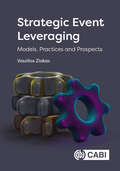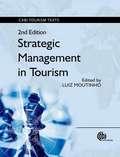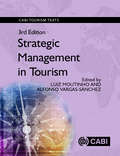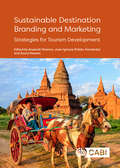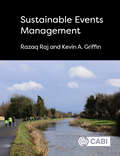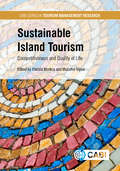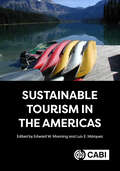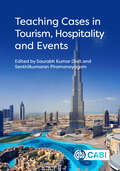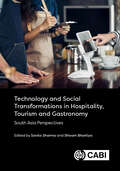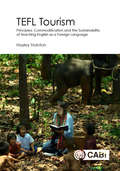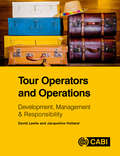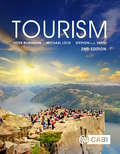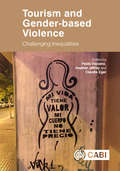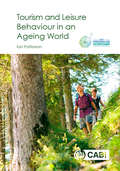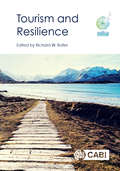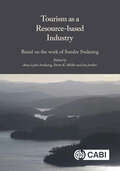- Table View
- List View
Strategic Event Leveraging: Models, Practices and Prospects
by Dr Vassilios ZiakasThis book comprehensively describes, explains, critiques and refines our current perspectives of event leveraging and, in so doing, provides an analytic account of the subject area as a whole, as it concerns the strategic pursuit of attaining and magnifying benefits that derive from events. Encompassing all events including sport, cultural and business, it also covers all kinds of benefits that can be leveraged and lead to sustainability through triple-bottom-line assessment. The book takes an interdisciplinary approach to cross boundaries and creates linkages among the parent disciplines (sport management; events, hospitality and tourism; leisure studies, parks and recreation) and general disciplines (management, marketing, sociology, anthropology, urban and regional planning). Written by an experienced author well-known in the field of event management and leveraging, this book: - Examines the art of event leveraging and contributes to the literature by refining pertinent theory. - Presents and explains theoretical models of event leveraging and emergent derivative frameworks. - Reveals major practices, issues and lessons from literature and case studies. - Integrates disciplinary applications of event leveraging to further refine the theoretical perspective through an interdisciplinary lens. - Develops a comprehensive outlook of event leveraging as a means to sustainability. Building a truly global and transdisciplinary framework, the author provides direction and possibilities that can lead to new forms of leveraging, making this an excellent resource for researchers, practitioners and students interested in event management and policy, sport management, recreation and leisure, and hospitality, tourism and festival management.
Strategic Management in Tourism
by Larry Dwyer Geoff Southern Luiz Moutinho Dimitrios Buhalis Stephen Witt James Wilson Enrique Bigné Jithendran Kokkranikal Anne-Mette Hjalager D Parra LópezFully updated with new chapters linking strategic thinking and action in the management of tourism, this comprehensive textbook provides an analytical evaluation of the most important global trends in tourism and analysis of the impact of crucial environmental issues and their implications and the major factors affecting international tourism management. Following a successful first edition that is now a mainstream textbook in tourism courses, the book also covers marketing strategy, functional management and strategic planning in order to provide an integrated synthesis that will benefit students in their future careers, and also be useful to professionals working in the tourism sector.
Strategic Management in Tourism (CABI Tourism Texts)
by Alejandro Pérez-Ferrant Professor Alfonso Vargas-Sánchez Anne-Mette Hjalager Brent Ritchie Dawn Gibson Eduardo Parra-López Geoff Southern James Wilson Jithendran Kokkamikal José Alberto Martínez-González Kanes Rajah Kun-Huang Huarng Larry Dwyer Luiz Moutinho María Moral-Moral Mercedes Melchior-Navarro Professor Noel Scott Rafael Alberto Pérez Ronnie Ballantyne S. F. Witt Scott McCabe Shirley Rate Tiffany Hui-Kuang Yu Vanessa Yanes-Estévez Yawei Jiang Yvette ReisingerThis comprehensive textbook has, at its core, the importance of linking strategic thinking with action in the management of tourism. It provides an analytical evaluation of the most important global trends, as well as an analysis of the impact of crucial environmental issues and their implications. Fully updated throughout, this new edition: -Covers forecasting, functional management and strategic planning; -Includes extra chapters to incorporate a wider spread of important topics such as sustainability, authenticity and crisis management; -Contains pedagogical features throughout, such as learning objectives, questions and case studies to aid understanding Now in its third edition, and reviewing the major factors affecting international tourism management, this well-established student resource provides an essential overview of strategic management for students and professionals in the tourism sector.
STRATEGIC MANAGEMENT IN TOURISM, 3rd Edition (Cabi Tourism Texts)
by Luiz Moutinho Scott McCabe Mercedes Melchior-Navarro María Moral-Moral Eduardo Parra-López Kanes K. Rajah Shirley Rate Yvette Reisinger Alfonso Vargas-Sánchez Brent Ritchie Noel Scott Geoff Southern James Wilson S. F. Witt Vanessa Yanes-Estévez Ronnie Ballantyne Yawei Jiang Jithendran Kokkamikal Larry Dwyer Dawn Gibson Anne-Mette Hjalager Kun-Huang Huarng José Alberto Martínez-González Rafael Alberto Pérez González Alejandro P Rez-Ferrant Tiffany Hui-Kuang YuThis comprehensive textbook has, at its core, the importance of linking strategic thinking with action in the management of tourism. It provides an analytical evaluation of the most important global trends as well as an analysis of the impact of crucial environmental issues and their implications. Fully updated throughout, this new edition: covers forecasting, functional management, and strategic planning; includes extra chapters to incorporate a wider spread of important topics such as sustainability, authenticity, and crisis management; and contains pedagogical features throughout such as learning objectives, questions, and case studies. Now in its third edition and reviewing the major factors affecting international tourism management, this well-established student resource provides an essential overview of strategic management for students and professionals in the tourism sector.
Sustainable Destination Branding and Marketing: Strategies for Tourism Development
by Andy Heyes Sanjay Nadkarni José Alabau-Montoya María-Eugenia Ruiz-Molina Elson Mankhomwa James Malitoni Chilembwe Victor Ronald Mweiwa Ilke Basarangil Azilah Kasim Lim Cha Ling Gül Erkol Bayram Hugues Seraphin Professor Maximiliano Korstanje Moustafa A. Mekawy Perunjodi Naidoo Prabha Ramseook Munhurrun Vishnee Sowamber Hulisi Binbasioglu Ugur Akdu Serap Akdu Jeetesh Kumar Anshul Garg Azizul Hassan Krishnan Umachandran Hengky Sumisto Halim Yaiza López-Sánchez Ali Dalgic Derya Toksöz Sevda Sahilli Birdir Kemal Birdir Nese Aydin Kevser Çinar Daniel Weiss Ericka Amorim Priyakrushna Mohanty Hemachandran RajamanicamDestination branding and marketing form the backbone of tourism industry growth, but it is increasingly important that the strategies employed consider and promote sustainable solutions. This book provides a comprehensive set of tools and techniques for branding and marketing for sustainable tourism development. It blends tourism and marketing strategies with practical, innovative information technology solutions and a psychological perspective, providing illustrative case studies and examples to aid understanding. Addressing opportunities and challenges across the field, it also reviews how different types of tourism such as community based, accessible, film, agricultural and cultural-heritage tourism entail unique issues for development. Competition between destinations has led to a real need for different strategies in order to differentiate the tourism product. This book: - Uniquely covers both marketing and branding of a destination from a sustainability perspective; - Considers the role of emotions and experiences when advertising a destination; - Brings together a set of global authors to provide a varied and universally applicable approach to the subject. A thought-provoking read for anyone interested in questions of sustainability in destinations, this book provides an invaluable resource for researchers of tourism, marketing and international development studies as well as destination managers.
Sustainable Events Management
by Kevin Griffin Dr Razaq RajThis book introduces the reader to sustainable events management theory and practice, based on academic research and illustrated with empirical case studies. The book provides a comprehensive view of sustainable management and how it relates to the many sectors within the events industry. It emphasises the fundamental importance of local communities, businesses and stakeholders to events organisation in regional, national and international locations. It brings into focus international governing bodies, and national government strategic objectives as the corner stones for sustainable development in the events sector. The relationship between strategic objectives and on-the-ground operational responsibilities are presented using research by contributing authors and accredited organisations to add scope and depth. Best-practice case studies are used throughout the book to highlight and explain particular sustainable management issues and practices. The scope of the book is international and designed to educate undergraduate and postgraduate students and to support practitioners in their operational and administrative duties within their industry sectors.
Sustainable Island Tourism: Competitiveness and Quality of Life (CABI Series in Tourism Management Research)
by Louise Twining-Ward Robertico Croes Haywantee Ramkissoon Jack Carlsen Professor Kelly Bricker Allan S Allan S Elisa Elisa Maria Maria Gyumin Gyumin Deborah Kerstetter Dr Anna Farmaki Professor Levent Altinay Dr Muhammet Yasarata Meghan Beardsley Dr Marketa Kubickova Mariyam ZulfaTourism continues to grow, and as the industry develops, it is important for researchers and practitioners to fully understand and examine issues such as sustainability, competiveness, and stakeholder quality of life in tourism centres around the world. Focusing on the unique perspective of island tourism destinations, this book outlines impacts on, and potential strategies for protecting, the natural environment, local economy, and local culture. Presenting an interdisciplinary integrated approach, this important collection of new research: - Is the first book to provide coverage on sustainable tourism best practice in island destinations; - Focuses on the unique perspective of islands as destinations, exploring the interplays of competitiveness and quality of life; - Includes a portfolio of conceptual, empirical, and case-based studies written by international experts to give a balanced and comprehensive view. A timely and important read for researchers, students and practitioners of tourism, this book also provides a valuable resource for researchers of sustainability and environmental science.
Sustainable Tourism in the Americas
by Mirtha Ampudia Sade Cameron Rafael Cartay Dalia J. Correa Leonardo M. Cuetara Yenis Cuetara Luis Ricardo Davila Roberto Frias Maria L. Izaguirre Bisleyvys Jimenez Glenn Mandziuk Ellen Walker Matthews Brian T. Mullis Patricio Tamariz Dueñas Hebe VessuriSustainable Tourism in the Americas introduces the reader to the establishment of sustainable tourism across the region. It examines questions such as 'what is really meant by sustainable tourism?' Covered in eight chapters, the book discusses the evolution and application of the concept in the Americas from its origins as well as documenting established success stories of sustainable tourism policy and implementation from several countries in the Americas. The country and regional case studies critically examine what sustainable tourism means in their destination and address how in practice the concept of sustainability can be built to show results across different cultural and ecological situations ranging from local indigenous sites to urban environments. The book presents solid findings and includes content from: · research of academics and experiences of those working within the heritage setting; · recent criteria and indicators of sustainable tourism developed by GSTC and other standards, indicators and observatories work associated with UNWTO; · success stories of managing Western tourism destinations and applies relevant lessons to Americas; · Provides support to those who need to study and manage impacted destinations. It will be a valuable addition to the current lack of literature on this concept and of particular interest to those working within and studying tourism management and related themes.
Teaching Cases in Tourism, Hospitality and Events
by Julia N Albrecht Andrés Artal-Tur Willem Coetzee Clara Cubillas-Para Delly M. Chatibura Aarti Dangwal Sushant M. Desale Kalliopi Fouseki Joo-Ee Gan Su Gibson Matt Gnagey Kathryn Hayat Jamie Hoffman Pilar Jiménez-Medina Rohan Jugran Ilias Krystallis Professor Maximiliano Korstanje Mohit Kukreti Kimberley Camelia Langstieh Rachel Hyunkyung Lee Tiffany S. Legendre Vasantha Lakshmi Sarat Kumar Lenka Kamakshi Maheshwari Drew Martin Miguel Mayol-Tur Amitabh Mishra Snigdha Mishra Cass Morgan Nametsegang Motshegwa Selvalakshmi Muthuvelu Preeti Narendra José Miguel Navarro-Azorín Naresh P Nayak Evarisa M. Nengnong Dr Binh Nghiem-Phu Maria Isabel Osorio-Caballero Kabila Ramanathan Dr Senthilkumaran Piramanaygam Andrea Salustri Shwetasaibal Samanta Sahoo Noelia Sánchez-Casado Kader Sanliöz-Özgen Hugues Seraphin Colin Seymour Abhijeet Shirsat Chandradeep Singh Hang T.B. Tran Ranjana Tiwari Alan Vijay Alejandra Zuccoli V. J. SivakumarThe tourism, hospitality and events industries comprise one of the largest and most diverse workforces in the world, creating high demand for graduates with strong technical and managerial competencies. Case-based learning encourages students to think, understand, and apply the concepts and theories they're taught into practical, everyday situations faced in the world of work. Providing a broad selection of extensive global cases, this book forms a comprehensive one-stop-shop resource for readers to test their analytical skill and abilities in solving complex management issues. Cases include teaching notes to reflect theoretical perspectives, as well as questions, detailed learning activities and solutions. The book covers: - General management, including innovation, ethics, and sustainability; - Strategic management, including business models, SWOT analyses and internationalisation; - Human resource management, including motivating employees, conflict management and work-life balance; - Marketing, including managing service quality, branding and new service development; - Financial management, including budgeting, risk management and forecasting; - Operations management, including food and beverage delivery, revenue management and health and safety. A useful and engaging read for students of tourism, hospitality and events, this book is also a valuable compilation of examples of practice for people working in industry.
Technology and Social Transformations in Hospitality, Tourism and Gastronomy: South Asia Perspectives
by Omar Abdullah Kamlesh Attri Vaibhav Bhatt Sonali Chhetri R K Dhodi Rashmi Dhodi Afsheen Hassan Fatemeh Shah Hosseini Amandeep Khurana Amit Kumar Sanjeev Kumar Suneel Kumar Varinder Kumar Rekha Maitra Zahra Nadalipour Teena Pareek Bindu Roy Dilraj Singh Shadev Sidharth Srivastava Tahir Sufi Kuldeep VermaThis book explores the relationship between technology and social transformation in tourism, hospitality and gastronomy. It presents research and case studies, elaborating on benchmark practices adopted by tourism and hospitality professionals. In recent years, technology has transformed the tourism and hospitality industry; the chapters in this book cover areas such as guest experience and service quality, as well as operational areas such as housekeeping and waste management. Further social transformation in tourism is a result of drivers such as a growing interest in gastronomy and the use of social media; this is covered in the first part of the book. The second part outlines how communities may learn from these events. With contributions from academics, entrepreneurs, destination managers and government officials from the South Asia region, this book offers a real insight in to these areas of growing interest and provide a useful resource for those researching and studying within the areas of tourism development and hospitality.
TEFL Tourism: Principles, Commodification and the Sustainability of Teaching English as a Foreign Language
by Hayley StaintonThere is evident lineage between the concepts of teaching English as a foreign language (TEFL) and tourism, represented through evocative marketing material, the commoditisation of the TEFL product, teacher motivations and experiences. Yet, to date there has been no recognition of these links within industry or academia. This book introduces the concept of 'TEFL tourism', outlining the scale of the sector and the rapid commercialization of TEFL teaching across the world, locating it as an emerging form of niche tourism. The text outlines the organisation types and geographical locations, emphasizing the commodification of English language teaching. It also outlines the types of TEFL tourists, the complexities of international education, links with various tourism forms and sustainability considerations of the industry. Key features include: - The first book of its kind - Case studies throughout add context to the theoretical presentation of the industry - Presents relevant industry statistics - Addresses sustainability and stakeholders. The book will appeal to tourism academics and students, in particular those with interests in educational and volunteer tourism as well as sustainable tourism and commodification.
Tour Operators and Operations
by Jacqueline Holl David LeslieWith a focus on the creation and distribution of packaged holidays, this text covers the fundamentals of business and the relationship between tour operators and destinations. With particular reference to the sustainability of both parties, it reviews the impacts and influences of tour operations and practices on destinations within the overriding context of tour operator responsibility. It addresses the entirety of this key component of the tourism sector, and reflects the shift in recent years from traditional 'sun, sea and sand' holiday to more bespoke packages. Taking into account tour operators as a growing factor among the major emergent economies of the world, this book is: - The first textbook to provide such in-depth content of tour operators and operations. - Written by authors with industry, research and teaching experience. - A wealth of information regarding popular eco, nature and adventure trips, as well as myriad niche and special interest products. Full of international and highly topical case studies, exercises and discussion questions, Tour Operators and Operations: Development, Management and Responsibility is a fundamental text for students of tourism.
Tour Operators and Operations: Development, Management and Responsibility
by Jacqueline Holland David LeslieWith a focus on the creation and distribution of packaged holidays, this text covers the fundamentals of business and the relationship between tour operators and destinations. With particular reference to the sustainability of both parties, it reviews the impacts and influences of tour operations and practices on destinations within the overriding context of tour operator responsibility. It addresses the entirety of this key component of the tourism sector, and reflects the shift in recent years from traditional 'sun, sea and sand' holiday to more bespoke packages. Taking into account tour operators as a growing factor among the major emergent economies of the world, this book is: - The first textbook to provide such in-depth content of tour operators and operations. - Written by authors with industry, research and teaching experience. - A wealth of information regarding popular eco, nature and adventure trips, as well as myriad niche and special interest products. Full of international and highly topical case studies, exercises and discussion questions, Tour Operators and Operations: Development, Management and Responsibility is a fundamental text for students of tourism.
Tourism
by Peter Robinson Stephen Smith Dr Michael LückCovering the fundamental topics in tourism studies this textbook for undergraduate students provides a thorough exploration of tourism as it is taught in higher education. Introducing tourism as an academic subject and guiding students through the early years of their tourism studies Tourism is relevant not just to tourism courses but also leisure, events, transport and travel, hospitality and business studies. Postgraduate students will also find it a valuable refresher to general tourism topics. The text is presented to reflect current teaching methods and provide an up-to-date perspective in an accessible way. Tourism begins by addressing tourism perspectives - defining tourism and setting it in a real-world business and economic context, before considering tourism people with a two-pronged approach - those employed in the tourism sector and travellers, visitors and holiday-makers who consume tourism products. Thereafter the operational elements of tourism are described in-depth: the infrastructure, facilities, legislation, financing, destination management and destination strategy that support tourism operations. Tourism development is the theme of the next section, introducing the concepts of planning, the role of organisations, tourism impacts, rural tourism, resources and sustainability. The book concludes with a discussion of tourism futures - tourism research, change, postmodernism and globalisation, and describes emerging tourism trends such as space tourism, virtual reality and the slow movement. View the free online resources for this book. Authored by established experts from North America, Europe and Australasia Tourism provides a truly international coverage of the subject, applicable to students in all geographic regions. Chapters have been laid out to guide students through the subject in a logical way and pedagogic features such as learning objectives, chapter introductions, chapter reviews, review questions and question-and-answer sections help to reinforce important concepts and aid learning. While informative features including case studies, figures, industry comments, career profiles and destination profiles provide a stimulating and enlightening insight into the current state of the tourism industry and those who work within it.
Tourism: A Regional Review (Contemporary Tourism Reviews Ser.)
by Dr Peter Robinson Dr Michael Lück Stephen SmithFully revised, Tourism, 2nd edition covers aspects of tourism from a modern perspective, providing students with a range of theoretical and research-based explanations, supported by examples, case studies and unique insights from industry representatives. The many facets of tourism management are presented in a style that is as relevant for 1st year students as it is for postgraduates. The text offers introductory definitions and detailed discussions of contemporary issues that recognize current teaching practice around the world. Covering topics such as policy and planning, heritage management, leisure management, event management and hospitality management, the book tackles the practical elements of academic tourism such as infrastructure management and economic development, together with other important contemporary issues such as sustainable development and post-tourists. This new edition also features: · Updated and new contemporary case studies, including countries such as Egypt, Croatia and The Philippines · New material on · tourism and sustainability including the SDGs · Unions in the travel and tourism sectors · Gender issues in travel and tourism · Augmented reality and robots · Prosumption and co-creation · Contributions from professionals working in the tourism industry for a real-world perspective · A fresh new layout and full colour text and figures that make it easy to locate information and aid learning · Links to new video material throughout, which provide easy access to additional content for further study This will be an essential text for all students of travel and tourism at all levels of study.
Tourism and Animal Welfare: Rights, Welfare, And Wellbeing (Routledge Research In The Ethics Of Tourism Ser.)
by Neil Carr Donald Broom"This text is long overdue and timely. Carr and Broom have placed the issues firmly in the broader context of the relationship between our species and the others which share this planet with us...As they argue it is possible for tourists and the travel and tourism sector to take and exercise responsibility to drive change, Carr and Broom's text helps us to understand the issues and the context and to make better-informed choices." Harold Goodwin Responsible Tourism Partnership Animals are among the most sought after tourist attractions and the impact on them is a matter of concern to an increasing number of people. Tourism and Animal Welfare uniquely addresses the issue of animal welfare within the tourism experience. It explores important foundations such as the meaning of 'animal welfare' and its relation to ethics, animal rights and human obligations to animals. It also explores the nature and diversity of the position and role of animals within tourism. 'Tales from the front line' is the section of the book that provides the reader with the views and experiences of animal welfare organisations, individual leaders, tourism industry organisations and operators, and academic experts. These case studies and opinion pieces will encourage the reader to consider their own position regarding animals in tourism and their welfare. The book: · is written by an authoritative author team that draws from the fields of tourism studies (Neil Carr) and animal welfare science (Donald Broom); · contains 14 case studies written by internationally recognised experts and iconic individuals in the field of animal welfare; · is written in an engaging style and features full colour illustrations. From students and academics to vets and those working within the tourism industry, this book will provide an engaging and thought-provoking read. It will also appeal to those with an interest in animal welfare, particularly in relation to the tourism industry.
Tourism and Animal Welfare: Rights, Welfare, And Wellbeing (Routledge Research In The Ethics Of Tourism Ser.)
by Neil Carr Donald Broom"This text is long overdue and timely. Carr and Broom have placed the issues firmly in the broader context of the relationship between our species and the others which share this planet with us...As they argue it is possible for tourists and the travel and tourism sector to take and exercise responsibility to drive change, Carr and Broom's text helps us to understand the issues and the context and to make better-informed choices." Harold Goodwin Responsible Tourism Partnership Animals are among the most sought after tourist attractions and the impact on them is a matter of concern to an increasing number of people. Tourism and Animal Welfare uniquely addresses the issue of animal welfare within the tourism experience. It explores important foundations such as the meaning of 'animal welfare' and its relation to ethics, animal rights and human obligations to animals. It also explores the nature and diversity of the position and role of animals within tourism. 'Tales from the front line' is the section of the book that provides the reader with the views and experiences of animal welfare organisations, individual leaders, tourism industry organisations and operators, and academic experts. These case studies and opinion pieces will encourage the reader to consider their own position regarding animals in tourism and their welfare. The book: · is written by an authoritative author team that draws from the fields of tourism studies (Neil Carr) and animal welfare science (Donald Broom); · contains 14 case studies written by internationally recognised experts and iconic individuals in the field of animal welfare; · is written in an engaging style and features full colour illustrations. From students and academics to vets and those working within the tourism industry, this book will provide an engaging and thought-provoking read. It will also appeal to those with an interest in animal welfare, particularly in relation to the tourism industry.
Tourism and Gender-based Violence: Challenging Inequalities
by Laura Aguilera Ávila Sara Ali Abdelghani Zaid Alrawadieh Yaxin Chen Donna Chambers Jannick Friis Christensen Derya Demirdelen Ayla Deniz Isis Arlene Díaz-Carrión Lauren Duffy Jocelyn Finniear Ching-Hua Ho Ismail Kervankiran Ellen Koppa Tenia Kyriazi Nigel J Morgan Ana María Munar Alberto Jonay Rodríguez Darias Dimitrios Stylidis Hande Turkoglu Elaine Chiao YangGender based violence (GBV) in travel and tourism is embedded within wider social structures of gender inequalities and discrimination. This book focuses on the multiple and interconnected manifestations of violence that women and girls encounter in tourism consumption and production, such as physical, sexual, emotional or socio-economic abuse. The book adopts a multidisciplinary perspective in its critical examination of the theoretical landscape of GBV, and its engagement with case studies on GBV and sexual harassment. It draws on feminist, intersectional and post-colonial frameworks, bringing together contributions from academics and practitioners across the globe. This book: Provides a critical approach to gender-based violence as part of broader social structures of inequality and discrimination in the tourism and hospitality industries. Draws on a range of disciplinary approaches, includinggender studies, geography, international relations, law, sociology and tourism studies. Brings together work by scholars who are engaging with the concept of gender-based violence in a wide range of tourism settings and practices. Includes profiles of organisations and initiatives that are attempting to tackle GBV in tourism, hospitality and beyond. Exploring an important topic of current times, this book will be of interest to researchers and practitioners in the areas of tourism, hospitality, gender studies, international relations, law, geography and sociology.
Tourism and Geopolitics
by Derek HallWith 29 contributors from across Europe and beyond, this work represents a unique and important resource that examines the many relationships between tourism and geopolitics, with a focus on experiences drawn from Central and Eastern Europe. It begins by assessing the changing nature of 'geopolitics', from pejorative associations with Nazism to the more recent critical and feminist geopolitics of social science's 'cultural turn'. The book then addresses the important historical role of Central and Eastern Europe (CEE) in geopolitical thinking, before exemplifying a range of contemporary interactions between tourism and geopolitics within this critical region. Edited by a renowned authority on tourism geopolitics, this book: #65533; Provides the most comprehensive overview of tourism and geopolitics available #65533; Applies a range of geopolitical concepts and approaches to empirical experiences of tourism and mobility in Central and Eastern Europe #65533; Embraces contributions from both established and new academic voices. Pursuing innovative analytical paths, the book demonstrates the interrelated nature of tourism and geopolitics and emphasizes the freshness of this research area. Addressing key principles and ideas which are applicable globally, it is an essential source for researchers, teachers and students of tourism, geography, political science and European studies, as well as for diplomatic, business and consultant practitioners.
Tourism and Geopolitics: Issues and Concepts from Central and Eastern Europe
by Derek HallWith 29 contributors from across Europe and beyond, this work represents a unique and important resource that examines the many relationships between tourism and geopolitics, with a focus on experiences drawn from Central and Eastern Europe. It begins by assessing the changing nature of 'geopolitics', from pejorative associations with Nazism to the more recent critical and feminist geopolitics of social science's 'cultural turn'. The book then addresses the important historical role of Central and Eastern Europe (CEE) in geopolitical thinking, before exemplifying a range of contemporary interactions between tourism and geopolitics within this critical region. Edited by a renowned authority on tourism geopolitics, this book: · Provides the most comprehensive overview of tourism and geopolitics available · Applies a range of geopolitical concepts and approaches to empirical experiences of tourism and mobility in Central and Eastern Europe · Embraces contributions from both established and new academic voices. Pursuing innovative analytical paths, the book demonstrates the interrelated nature of tourism and geopolitics and emphasizes the freshness of this research area. Addressing key principles and ideas which are applicable globally, it is an essential source for researchers, teachers and students of tourism, geography, political science and European studies, as well as for diplomatic, business and consultant practitioners.
Tourism and Leisure Behaviour in an Ageing World
by Ian PattersonTourism and Leisure Behaviour in an Ageing World, based on Ian Patterson's previously published Growing Older, provides an overview of the latest research concerning tourist behaviour and leisure needs of baby boomers, seniors, and older adults. With an increasingly ageing population, industry interest has intensified and there has been a corresponding explosion in related research activity. Covering marketplace trends that attract the older market, this new edition: - Provides an understanding of the older tourism and leisure market, discussing how to effectively provide for this expanding group; - Discusses growing areas such as independent travel, the leisure experience, cultural and heritage tourism, cruises, and health and wellness tourism; - Supplies case studies of tourism and leisure organizations successfully catering to the needs of the older market. This book is an invaluable resource for researchers and students interested in senior leisure and travel, a section with the money and the time to invest heavily in leisure and tourism activities. It can also be applied by professionals to improve their product offerings for this sector, which, while valuable, brings its own unique challenges.
Tourism and Leisure Behaviour in an Ageing World
by Ian PattersonTourism and Leisure Behaviour in an Ageing World, based on Ian Patterson's previously published Growing Older, provides an overview of the latest research concerning tourist behaviour and leisure needs of baby boomers, seniors, and older adults. With an increasingly ageing population, industry interest has intensified and there has been a corresponding explosion in related research activity. Covering marketplace trends that attract the older market, this new edition: - Provides an understanding of the older tourism and leisure market, discussing how to effectively provide for this expanding group; - Discusses growing areas such as independent travel, the leisure experience, cultural and heritage tourism, cruises, and health and wellness tourism; - Supplies case studies of tourism and leisure organizations successfully catering to the needs of the older market. This book is an invaluable resource for researchers and students interested in senior leisure and travel, a section with the money and the time to invest heavily in leisure and tourism activities. It can also be applied by professionals to improve their product offerings for this sector, which, while valuable, brings its own unique challenges.
Tourism and Resilience
by Richard W. ButlerThis is the first book to address the concept of resilience and its specific application and relevance to tourism, in particular tourism destinations. Resilience relates to the ability of organisms, communities, ecosystems and populations to withstand the impacts of external forces while retaining their integrity and ability to continue functioning. It is particularly applicable to tourism destinations and attractions which are exposed to the potentially harmful and sometimes severe effects of tourism development and visitation, but which also can experience increased resilience from the economic benefits of tourism. Phenomena such as destination communities, wildlife populations and ecosystems are discussed, as well as the ability of places and communities to use tourism and its infrastructure to recover from disasters such as tsunamis, earthquakes, unrest and disease. This book: #65533; Compares the relevance of resilience to sustainability #65533; Contains contributions from many of the leading international authors #65533; Brings together varying viewpoints of both conceptual and applied issues #65533; Includes example case studies from Whistler, western Canada; Sri Lanka; Purnululu National Park, Australia; and the remote Pitcairn Island in the Pacific Tourism and Resilience is relevant for researchers, students and practitioners in tourism and related fields such as development studies, geography, sociology, anthropology, economics and business/management.
Tourism and Resilience
by Bruno Abegg Arjen Alberts Maria Amoamo Godfrey Baldacchino Susanne Becken Marta Berbés-Blázquez Jeremy Buultjens Athula Chammika Gnanapala Harold Goodwin Bijan Khazai Alan A Lew Glenn McCartney Pin T. Ng Jonathan Pugh Iraj Ratnayake Esteban Ruiz-Ballesteros Daniel Scott Valerie A. Sheppard Jennifer Strickland-Munro Robert Steiger Lisa Trawöger Tsung-Chiung WuThis is the first book to address the concept of resilience and its specific application and relevance to tourism, in particular tourism destinations. Resilience relates to the ability of organisms, communities, ecosystems and populations to withstand the impacts of external forces while retaining their integrity and ability to continue functioning. It is particularly applicable to tourism destinations and attractions which are exposed to the potentially harmful and sometimes severe effects of tourism development and visitation, but which also can experience increased resilience from the economic benefits of tourism. Phenomena such as destination communities, wildlife populations and ecosystems are discussed, as well as the ability of places and communities to use tourism and its infrastructure to recover from disasters such as tsunamis, earthquakes, unrest and disease. This book: · Compares the relevance of resilience to sustainability · Contains contributions from many of the leading international authors · Brings together varying viewpoints of both conceptual and applied issues · Includes example case studies from Whistler, western Canada; Sri Lanka; Purnululu National Park, Australia; and the remote Pitcairn Island in the Pacific Tourism and Resilience is relevant for researchers, students and practitioners in tourism and related fields such as development studies, geography, sociology, anthropology, economics and business/management.
Tourism as a Resource-based Industry: Based on the Work of Sondre Svalastog
by Øystein Aas Lars Aronsson Sjur Baardsen Børge Dahle Marko Košcak Brian McNeil Stian Stensland Sondre Svalastog Anthony TravisTourism as a Resource-based Industry presents the conceptual framework of the Norwegian economic geographer Sondre Svalastog and functions as a practical tool for analyzing and identifying resources when working towards a more sustainable tourism industry. Tourism resources and their sustainability are analysed through the lens of a multidisciplinary approach which includes social, economic, cultural and natural dimensions. Contextual awareness is achieved by combining research-based knowledge with local know-how and information on local conditions. The book facilitates a way forward that examines both productivity and sustainability. The usefulness and value of Svalastog's conceptual work is demonstrated by a selection of new case studies by experts in the field, from different countries including Sweden, Norway, Slovenia, and the UK. This book: - Identifies local conditions and resources, climate change concerns, different types of tourists and a variety of challenges in high-cost and low-cost countries. - Considers how best to maximise potential and production, ensuring that both the host community and tourist benefits. - Provides a wide-ranging selection of case studies covering topics such as urban heritage, national parks, niche tourism and location-specific tourism products. - Presents ideas on how to secure sound planning within the industry, using conceptual and methodological tools. Tourism researchers and students will find this book helpful for understanding the development of tourism and how it can contribute to the UN Agenda 2030 which reflects the urgency for change, to secure cultural and natural resources, health and social resilience, and the stability of a socially constructed economy. Thus, tourism research needs to include a constant review and if required, renewal of processes that manage how society, culture and natural resources are used to achieve a balanced sustainable tourism process.
